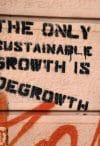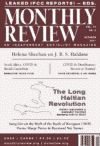
Measures to Defend Life on Planet Earth and Improve Living Conditions
Out of the dissatisfaction with the 2021 UN Climate Change Conference in Glasgow, Brazilian popular movements came together to propose measures to defend life on Earth. | more…

Out of the dissatisfaction with the 2021 UN Climate Change Conference in Glasgow, Brazilian popular movements came together to propose measures to defend life on Earth. | more…

The South African climate justice movement presents a model for popular revolt against the ecofascist project. | more…

Time is running out for the world to carry out the social transformations necessary to avert irreversible climate catastrophe, keeping the increase in global average temperatures below 1.5°C (or below 2°C). The most optimistic scenario currently provided by the UN Intergovernmental Panel on Climate Change (IPCC) describes a pathway in which the increase in temperature will not rise to 1.5°C until 2040, peaking at 1.6°C, and then falling back to 1.4°C by the end of this century. But to achieve this will require revolutionary scale transformational change in global social relations affecting the human relation to the climate and the planetary environment as a whole. | more…

We are facing today the most pronounced and remarkable of all contradictions: that between “capital’s time” and “nature’s time.” As a result, a series of intertwined ecological and social crises have come together, posing existential threats to life on the planet. | more…

In 1980, the great English historian and Marxist theorist E. P. Thompson wrote the pathbreaking essay “Notes on Exterminism, the Last Stage of Civilization.” Although the world has undergone a number of significant changes since, Thompson’s essay remains a useful starting point in approaching the central contradictions of our times, characterized by the planetary ecological crisis, COVID-19 pandemic, New Cold War, and current “empire of chaos”—all arising from features deeply embedded in the contemporary capitalist political economy. | more…

From September to November 2021, overlapping with the 2021 UN Climate Change Conference negotiations in Glasgow, three major interrelated developments occurred in global finance. Taken together, these changes mark a turning point in the financial expropriation of the earth and the culmination of a theoretical shift in the dominant economic paradigm aimed at the unlimited accumulation of total capital, which is now seen as including “natural capital.” | more…

Cuba’s world leadership in sustainable human development is of world-historic importance. | more…

With the rapidly worsening capitalist demolition of the planetary environment and the expansion of ecosocialist movements in response, leading establishment think tanks, like the corporate-supported Breakthrough Institute, dedicated to promoting the ideology of “green capitalism” at any cost, have found themselves in a difficult place. | more…

We should avoid offering a fatalistic worldview. In fact, the environmental movement in general and ecosocialism in particular are all about combating the current trend toward ecological destruction. Climate change is now “code red for humanity.” This is not a doomsday forecast but a call to action. | more…

A new poem by Marge Piercy. | more…

What was most significant about the published Part I of the report was that it revealed that even in the most optimistic projection of the Shared Socioeconomic Pathways—in which carbon emissions globally peak in the next four years, a 1.5°C increase in global average temperature over preindustrial levels would be avoided until 2040, and the goal of net zero carbon emissions would be reached by 2050—the consequences for global humanity would nonetheless be catastrophic by the measure of all historical precedents. | more…

We can analyze the new Biden administration, its personnel, and the policies it is likely to follow, especially on the all-important questions of the climate crisis and U.S. grand strategy toward China, by looking at the Council on Foreign Relations. | more…